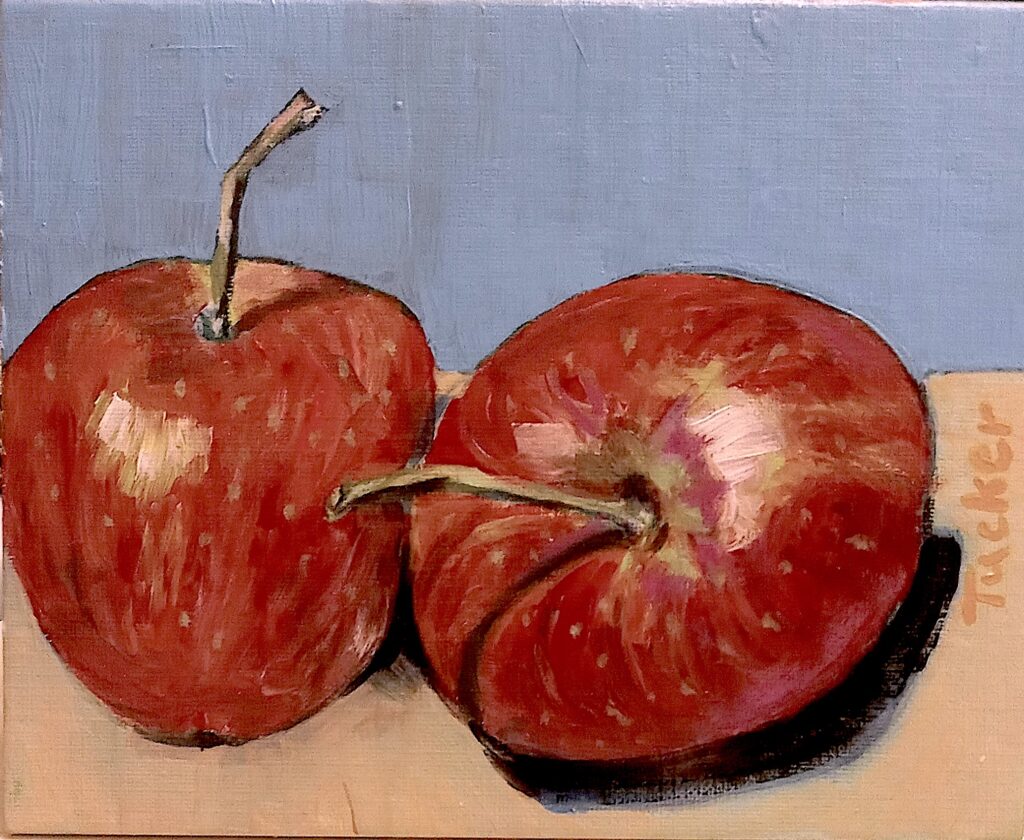Mischa Maisky is my favorite cellist in the world. Listen to this beautiful piece written by Max Bruch and you’ll understand why.
Mo Ghille Mear (My Gallant Hero) – Choral Scholars of University College Dublin
I love this choral group. All of their songs are wonderful!
An Old French Tune (by Georges Brassens) Performed by Pomplamoose
Ah, yes! This feels good—like Paris in Spring (though I’ve never been there, Spring or otherwise).
Eva Cassidy Sings Autumn Leaves
Perfect for the season!
Protected: Beta Readers’ Post: Datesville Chapter 4
Progress Report

A couple of weeks ago, I posted that I wanted to begin painting again. I used to paint a lot but in acrylics and most of my work then was semiabstract in terms of subject matter. But I got an urge to paint again, only this time in oil and starting with small pieces and, I said, I wanted to paint apples. Well, I’ve made my first attempt. I have much to learn about the medium of oil, but I’m having fun so far.
Above is my first small painting of apples. The support is an 8″x 10″ art board. I painted it in about three sessions.
I’ll post new pieces as I paint them.
Ana Vidovic Classical Guitar Concert at St. Mark’s in San Francisco
Protected: Beta Readers’ Post: Datesville Chapter 3
My Interview at Smashwords
 I have and interview over at Smashwords (where the ebook of “Wanderer Come Home” is available). I thought you might enjoy reading the interview there. So below, I’ve posted a little of that interview and a link to the whole thing over at Smashwords. Enjoy!
I have and interview over at Smashwords (where the ebook of “Wanderer Come Home” is available). I thought you might enjoy reading the interview there. So below, I’ve posted a little of that interview and a link to the whole thing over at Smashwords. Enjoy!
Interview With Dale Tucker (partial)
Jack-O’-Lantern Special!

A Special Limited Offer!
From now until the jack-o’-lantern’s smile caves in, don’t miss this opportunity to purchase your very own ebook copy of Wanderer Come Home (which has at least four ghost stories in it!) Get it for the SPOOKY GOOD price of $1.00. Don’t miss this opportunity and have it HAUNT you for the rest of your life. Yeeheeheeheehee (Sinister laughter!) And while you’re at it, grab a handful of this SWEET TREAT for a friend, too.
To grab this ghostly deal before it vanishes, just click on this JACK-O’-LANTERN link, press the yellow “Buy with coupon” button, enter the code HU74Q, then run for home (and a comfortable place to read) as fast as you can!
And Thank-you from me, your scarecrow friend. 
Dale
Protected: Beta Readers’ Post: Datesville Chapter 2
Today’s Rambling — Painting
About fifteen years ago, I was a painter. I lived in the Northwest at that time and made semiabstract paintings which I sold to, mostly, a limited number of collectors that I knew. I never sold enough work to live on my painting alone, so I always had one or two part-time jobs with which to pay the rent and feed myself. Later, I would meet the love of my life and eventually move east, to North Carolina, where we have made our home. And by then, I had transitioned from painting to writing as my creative work. But I still love painting.
I think I may try painting again. When I began writing seriously, trying to develop book-length fiction, I didn’t have room for painting. Writing took all of my creative energy and time; it still takes a lot. However, writing now has become a bit more natural for me where I am better able to pick up the story cold and reenter it without as much mental work as it used to take. And I would approach painting differently now. Now, I would think of it more as a hobby—an exploration into learning new techniques, though there is plenty of that in professional work as well. But I would paint small things, now, for my own amusement, not for exhibition.

I want to paint apples, fruit in general, still lifes. I want to work more on composition, the formal elements of shape, value, and space. I’ve been looking at Russian paintings—landscapes mostly—and find them wonderful in the way they capture mood. But I’m intrigued by fruit—apples in particular. I like the mottling of their hues, their spots, their indecisive color schemes, and their sheens. Maybe, this urge to paint again springs from a desire to create a biopic portrait because, perhaps, I am really an apple.
Protected: Beta Readers’ Post: Datesville Chapter 1
A Sample From Chapter 14 of “Datesville”
Our travelers are at a soup kitchen, run by the Missionaries of Charity in St. Louis, Missouri. The travelers have been riding in the black interior of an empty trailer of a tractor-trailer rig. The diver of the rig is an acquaintance of George’s, one of our five travelers, but the group has become uncertain they can trust the driver when he lets them out of the trailer to pick up freight. The group is supposed to continue its journey in the trailer through Illinois and on to Kentucky. The driver’s name is Sweeney. Note: Saints Peter and Paul is a large church in St. Louis.
Datesville: Out of the Land of Bondage! (excerpt from Chapter 14 — “Saints Peter and Paul”)
. . .
Armed now with his outdated atlas, George begins another geography lesson; this time for everyone.
“So here we are: St. Louis, Missouri,” says George. He has circled the label of the city on the map. None of us has noticed that the younger Sister who opened the hall for lunch now stands quietly right behind George until I do at that very moment. She lightly touches George on the shoulder, and he looks up.
“Oh, I’m sorry, Sister. Were you needing us to leave so you can lock up?” he asks.
“Oh no; I only noticed your atlas and was wondering if all of you are traveling together.” She makes eye-contact with each of us around the circle, and we nod to confirm that we are. “I’m Sister Michaela, by the way,” she continues, “and a lay missionary with the Missionaries of Charity. But I was wondering, if perhaps you plan to travel from St. Louis farther east, across the Illinois State line?”
“Well, as a matter of fact,” says George, “that’s exactly what we were trying to figure out: whether we should or not. Do you have a suggestion, Sister?”
“Yes, I do,” she answers. “Do you mind if I sit with you for a minute?”
George and Pearl scoot apart to give Sister Michaela a place between them. She sits then leans forward and, in a low voice, begins telling us her real reason for stopping by our table.
Sister Michaela, I soon learn, doesn’t pull punches.
“Just across the Mississippi,” she begins, “about two miles on the Interstate, is a weigh station that has been converted into a checkpoint. All truckers are required to stop there for inspection. What they’re looking for are so called ‘trailer hoppers'”.
She glances around the circle to confirm that we understand what she means by the term. We nod that we do.
“In essence, the state of Illinois is paying a bounty of three-hundred dollars per person for anyone caught traveling in the trailers.”
“We heard it was two-hundred, fifty,” says George.
“It used to be, but recently they’ve increased it to three-hundred. And drivers who lack scruples are cashing in on this immoral program. Basically, what they are doing is selling people like yourselves into bondage for personal gain. Most of the passengers, when turned over to the Illinois authorities, are charged with Felony Attempted Domestic Terrorism, regardless of what police might find in their duffle bags or backpacks. Even if it’s only a lighter or a pocketknife or a skillet, they’ll count these articles as weapons and evidence of ‘intent to commit an act of domestic terrorism’. And the inspectors always find something. And with such flimsy evidence, they’re shipping dozens of people every day—from this one checkpoint alone—off to the super prison near Paris, Illinois. Have you heard of it?”
“Yes, Reggie was telling us,” says George. The rest of us just nod, in stunned silence. It appears the reality of the situation is even worse than the rumor. It is obvious now that Sweeney knew about the checkpoint and planned to take us there.
“But—and here’s the good news,” continues Sister Michaela, “if you are headed east to the other side of the state, to Indiana or beyond, I know of a ministry that can help you get through Illinois. The ministry doesn’t even have a name; they are very underground; but we have a contact for them that we use. But for them to continue doing what they do, it’s important that no one knows they exist, and for that reason we ask you not to tell others about this unique ministry or how you came to know about it. Can you promise me you will not share this with anyone else?”
We all echo, “Yes. Of course. We won’t tell a soul.”
“Let’s have a look at your atlas,” Sister Michaela says. “Are you going somewhere specific?” she asks.
George shares with the Sister our story, how we’d hoped to get as far as Lexington, Kentucky with the help of our trucker “friend,” and that from there we’d planned to walk to Datesville, located in northern West Virginia, but then Reggie had warned us about trailer hoppers sometimes getting shanghaied and sent to gulags at random checkpoints, set up at weigh stations on highways and Interstates in the state of Illinois.
“I’m afraid your article was misleading,” says the Sister. “In Illinois, the checkpoints have always been permanent. Now, they might not be open twenty-four hours a day, everyday, at every location, but most of the time they are open and all truckers are required to stop at them when they are.”
“Wow!” says George. “We were doomed.”
“I knew there was something wrong with that man,” says Pearl, referring, of course, to Sweeney.
Sister Michaela shows us a small town in Indiana—Farmersburg, to be specific, just south of Terre Haute—where the underground ministry would take us, that is, if we chose to go and when there was room for us.
“It usually takes a day or two to make the arrangements,” says Sister Michaela, “but, if you want their help, I think we can work something out. And the Missionary Sisters can arrange for you a place to stay—perhaps not the most comfortable place, but at least a roof over your heads until your passage is secured.”
George looks to us for feedback. But Sister Michaela’s proposal doesn’t demand deliberation. We all know we are stuck between a rock and a hard place and her proposal looks as much like divine intervention as anything I’ve ever seen.
“I’m in!” says Reggie, resolutely. We all emphatically agree, so the question is settled: we will place our fate in Sister Michaela’s hands rather than Bill Sweeney’s.
“Good!” says the Sister. “Just give me a half-hour to speak with the Reverend Mother, okay? In the meantime, you can wait here, and I’ll show you where the facilities are should you need them. Have some more tea or coffee if you’d like. And please don’t worry: You are under Christ’s protection now; he will take care of you. I’ll be back soon.”
Sister Michaela rises, taking Pearl with her to show her where the restroom is. So the two of them scurry away. George watches as they exit through a door into the kitchen then quickly turns to Reggie, Bulchenko, and me.
“Do you think we can trust her?” he whispers hoarsely.
We all break into laughter.
“She’s a nun!” says Reggie.
“Yeah, I know,” says George, “but I thought I could trust Sweeney, too.”
For some reason Reggie, Bulchenko, and I find this remark incredibly funny. Finally, George laughs too.
“What? What? What’s so funny?” he laughs.
“You believe a guy like Sweeney but doubt a nun!” says Reggie. We all belly laugh again, and it feels good.
